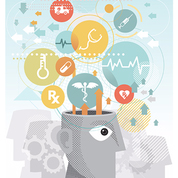Paying Attention to the Science

"My son was just diagnosed with ADHD, and I don’t know much about ADHD or its treatment," one mother recently wrote. "What can I do to help my son?"
Where do you turn for information when faced with a new diagnosis? How do you make sense of all the information out there from friends and family, media and sharp-looking websites all claiming to have the “best” information? Which sources can you trust to help you decide on treatment? Here are some suggestions.
Start with the guidelines for treating ADHD, which were developed by experts in the field of ADHD through years of research and scientific evidence. These treatments are recommended because of their proven effectiveness at addressing ADHD symptoms and because of their track record of safety. Effective treatment combines education about ADHD, behavioral management techniques (and for children, academic accommodation programs) and medication management. Evidence-based medicine incorporates your specialist’s experience in treating ADHD and your specific needs. It tailors treatment to you or your child and is responsive to changing symptoms or life situations.
Not all the information offered online or in popular media is scientifically accurate. You need to evaluate possible treatment approaches against the available science of ADHD. Your specialist, who is trained in evidence-based treatment, can be your guide when determining treatment options.
ADHD is a lifespan disorder that affects individuals throughout their lives and requires a comprehensive approach to treatment for children and adults to be effective. In determining the best treatment approach, the ADHD professional will consider many factors including age, life circumstances, and effectiveness of the specific treatment. Regular monitoring of progress is important, as is adjusting the treatment when needed.
Just as important as selecting an evidence-based treatment approach for ADHD is selecting the right professional to work with you. Ask questions when first contacting a professional:
- What is the professional’s training in ADHD? Is the professional licensed to practice and diagnose ADHD?
- How many patients or clients has the professional treated and can you talk with any about their experience?
- How does he or she keep up to date on ADHD information and treatment?
- What is the professional’s approach to treating ADHD? Does she or he work with other professionals to provide a comprehensive treatment plan, and if so, whom?
When you have questions about ADHD or forms of treatment, discuss them with your ADHD professional. You can also contact the National Resource Center on ADHD for the latest on ADHD research and treatment.
